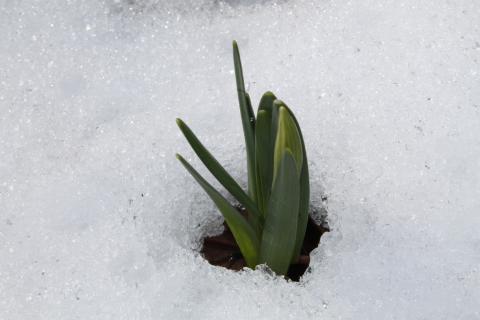Why are my bulbs coming up early?

In New Hampshire, most spring flowering bulbs start to come up in March or April. However, warm temperatures and limited snow coverage in mid-to-late winter can encourage bulbs to start growing far earlier than expected. Bulbs planted on the south or west sides of houses near the foundation are the most likely to be affected. Warmth from sunlight reflected off of the home, as well as the heat from the home itself, can increase the soil temperature and speed up bulb development. Snowdrops, daffodils and crocus are some of the most likely culprits, though tulips can also come up early, depending on weather conditions.
Early bulb growth is usually little cause for concern. Foliage that comes up early may be damaged by freezing temperatures, but as long as the flower buds are still beneath the soil, the bulb is still likely to bloom in the spring. The leaves may look a little tattered later in the spring, but the flowers should distract from them.
Unfortunately, if flower buds emerge in the winter and normal temperatures return, they will usually be frozen and fail to bloom. Nonetheless, even if a bulb fails to flower in one season, there’s still a good chance that it will the following. Applying a thick layer of organic mulch over bulbs in the late fall or early winter (once the soil temperature has cooled to 40°F) may help keep them dormant until spring, despite unseasonably warm weather.
Just because bulbs start to grow in the winter doesn’t mean that they will bloom early. The return of cold weather can delay further growth and keep bulbs from flowering until a more appropriate time. A blanket of snow on the ground can halt progress as well as protect the emergent foliage from extreme temperatures.
Got questions? The Ask UNH Extension Infoline offers practical help finding answers for your home, yard, and garden questions. Call toll free at 1-877-398-4769, Monday to Friday, 9 a.m. to 2 p.m., or e-mail us at answers@unh.edu.
Do you love learning about stuff like this?
SUBSCRIBE TO Granite State Gardening newsletter
Got questions? The UNH Extension Yard and Garden Infoline offers practical help finding answers for your yard and garden questions.
Call toll free at 1-877-398-4769, Monday to Friday, 9 a.m. to 2 p.m., or fill out webform.
